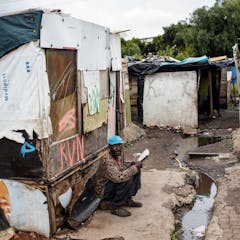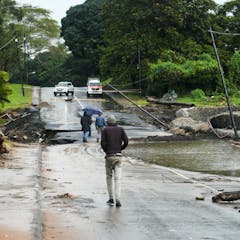
Articles sur Cholera
Affichage de 1 à 20 de 81 articles

In South Africa, a group of citizen scientists who test water quality and log the results on a specialised app have helped keep the water supply for 4.3 million people clean.

The world’s stockpile of cholera vaccines has run dry, bad news for cholera-ravaged southern Africa. Why is this and what is being done to address vaccine shortages in Africa?

Heat, floods and droughts create conditions for pathogens and their vectors.

The security situation in Haiti must change – but another UN intervention may not be the way this happens.

The aim of vaccination is to prevent infection. In addition, vaccination is intended to reduce the risk of severe illness.

Over the last two years, routine immunisation services and coverage of essential childhood vaccines have been disrupted.

Good legislation has been undermined by poor planning, limited investment and governance, but recent water reports suggest the government recognises the scale of the problems.

The primary reasons for the systemic collapse include poor operation, defective infrastructure, the absence of disinfection chemicals, and lack of monitoring.

The current cholera outbreak is not necessarily an issue with potable water. It’s the result of a combination of factors including dysfunctional and non-compliant wastewater treatment works.

According to the WHO, the global cholera situation has deteriorated.

This whirlwind tour of social history describes how infectious diseases have shaped humanity at every stage. It suggests reducing inequality will give us our best chance of surviving future plagues.

A new global dataset shows there is no clear global increase of infectious disease outbreaks over time. And it can suggest which countries would most likely be affected by an outbreak.

Antibiotic resistance has contributed to millions of deaths worldwide. Research suggests that any bacteria can develop antibiotic tolerance, and possibly resistance, when pushed to their limits.

The focus of efforts to save the lives of earthquake victims needs to shift to the emerging threats from disease and lack of clean water and shelter.

Cholera has persisted longer in Africa largely due to worsening hygiene and sanitation situations in urban areas.

The human population has doubled in 48 years, and worsening climate change has left the world facing serious health risks, from infectious diseases to hunger and heat stress.

Natural disasters associated with climate change put people at risk of injury and death, and alter the prevalence and distribution of illnesses and infectious diseases.

Nigeria must adopt a multi-pronged approach to address its flooding menace and minimise the effects.

On World Rabies Day – which is also the anniversary of French microbiologist Louis Pasteur’s death – a virologist reflects on the achievements of this visionary scientist.

These maps have gone viral – here’s what they owe to 19th century cholera campaigns.
